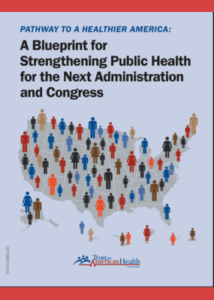Pathway to a Healthier America: A Blueprint for Strengthening Public Health for the New Administration and Congress
Report provides the Administration and Congress taking office in 2025 a policy roadmap for improving the nation’s health, economy, and national security.

(Washington, DC – October 8, 2024) – The public health system—responsible for protecting and promoting health in every community— needs sustained investment, policy support, and protection from political interference. This report is the fifth in a series of reports TFAH has done to align with the presidential election cycle. It provides the Administration and Congress taking office in 2025 a policy roadmap to improve the nation’s health outcomes and bolster its economic and national security by strengthening the public health system. The report was authored after consultation with over 45 public health officials, experts, and organizations.
The public health system is at an inflection point. Americans are living longer, thanks in part to public health interventions. However, too many people are still suffering from preventable health problems, weather-related emergencies are occurring more frequently and with more intensity, and population-level health disparities persist.
The public’s health and the public health system are at risk on several fronts. Underfunding has weakened the public health infrastructure and its workforce. Mis- and disinformation and politicization have contributed to distrust of public health officials and guidance. Public health’s ability to protect communities is also at risk due to proposed or enacted policies that undermine the role of public health officials or limit access to preventive healthcare.
This report includes recommendations across six priority areas to protect and strengthen the public health system and our nation’s health security. The following are highlighted recommendations from the report. See the report for the inclusive set of recommendations.
Read the Full Report
Priority Areas and Highlighted Recommendations
Priority 1: Invest in Infrastructure and Workforce to Ensure our Public Health System Can Meet the Challenges and Opportunities of the 21st Century.
Chronic underinvestment in public health has limited the system’s ability to modernize basic public health infrastructure and provide essential and preventative services. Increased, sustained, and flexible public health funding is needed. Recommended policy actions include:
- Congress should protect and increase overall funding for the Centers for Disease Control and Prevention (CDC).
- Congress should ensure continuous improvement of public health infrastructure.
- Congress should invest in public health data modernization and enact the Improving DATA in Public Health Act to better detect and contain health threats.
- Congress and HHS agencies should support efforts to bolster recruitment, retention, and resilience of the public health workforce.
Priority 2: Strengthen Prevention, Readiness, and Response to Health Security Threats.
Public health hazards, such as infectious disease outbreaks and weather-related disasters, are increasing but too often the agencies charged with responding to such emergencies are hampered by inadequate funding and challenges to public health authorities. Recommended policy actions include:
- The White House should maintain coordination and leadership around public health emergencies and biodefense.
- Congress should expand public health emergency preparedness funding for state, tribal, local, and territorial jurisdictions.
- Congress and the Administration for Strategic Preparedness and Response (ASPR) should strengthen the emergency readiness of the healthcare delivery system.
- Congress should enact legislation to ensure access to vaccines for uninsured and underinsured adults.
- The White House and Congress should renew the nation’s Global Health Security Commitment.
- Congress should support nationwide efforts to protect against environmental and climate-related health threats through the National Center for Environmental Health (NCEH) and the Agency for Toxic Substances and Disease Registry (ATSDR).
- Congress and the administration should support interagency efforts to address the impact of extreme heat on health.
Priority 3: Promote the Health and Well-being of Individuals, Families, and Communities Across the Lifespan.
The U.S. has the highest death rates for avoidable or treatable conditions as compared with other high-income nations, and, on average, the community conditions of where a person lives impacts how healthy they can be and how long they will live. Recommended policy actions include:
- Congress should increase funding to CDC’s National Center for Chronic Disease Prevention and Health Promotion.
- Congress should enhance benefits in and protect access to the Supplemental Nutrition Assistance Program and should make healthy school meals for all permanent.
- Congress should create a national standard requiring employers to provide job-protected paid sick, family, and medical leave for all employees.
- Congress and HHS should address Adverse Childhood Experiences (ACEs) by passing the Preventing Adverse Childhood Experiences Act and increasing the investment in the CDC ACEs program.
- Congress should fund the nationwide implementation of CDC’s Comprehensive Suicide Prevention Program and support Substance Abuse and Mental Health Services Administration’s efforts to bolster the continuum of crisis care.
- Congress and the Administration should fund CDC’s internal capacity for healthy aging efforts and its support to build and sustain age-friendly public health systems in state, local, tribal, and territorial public health departments.
Priority 4: Advance Health Equity by Addressing Structural Discrimination.
Long-standing and ongoing structural discrimination and inequities have led to persistent disparities in Americans’ health and well-being including higher rates of chronic disease among populations that have been disadvantaged. Recommended policy actions include:
- Federal agencies should regularly update and report progress on agency equity plans, ensuring metrics are inclusive of and extend beyond tracking disparities.
- Congress and the Administration should ensure accurate and complete data collection to report health-related information by race/ethnicity, age, sex, disability, language, sexual orientation, gender identity, and geography.
- Federal health agencies should focus funding on populations at elevated risk for chronic disease and poor health outcomes due to the impact of structural discrimination and disinvestment.
Priority 5: Address the Non-Medical Drivers of Health to Improve the Nation’s Health Outcomes.
Non-medical drivers, also referred to as the social determinants of health, such as where people are born, grow, live, work, and age, are a significant contributor to a person’s health. Recommended policy actions include:
- Congress should increase funding to $150 million for the Social Determinants of Health program at CDC and pass the Improving Social Determinants of Health Act.
- The Administration should continue to build on the Centers for Medicare & Medicaid Services’ (CMS) efforts to support Medicaid, Medicare, and Children’s Health Insurance Program coverage of patients’ health-related social needs.
- CMS and Congress should explore opportunities to expand the capacity of healthcare providers and payers to screen and refer individuals to social services.
- Congress should amend tax laws to increase economic opportunity for families by expanding access to the Child Tax Credit and Earned Income Tax Credit.
Mis- and disinformation, an erosion of trust in public health officials, and threats to public health structure and authority are putting decades of public health progress at risk and jeopardize the nation’s health and economy. Recommended policy actions include:
- The Administration and Congress should maintain the existing structure of federal health agencies, which have specific roles and expertise in protecting the nation’s health.
- The Administration should protect the scientific integrity of public health agencies and leaders.
- Congress and HHS should invest in and prioritize effective public health communications and reducing the spread of misinformation and disinformation.
- Lawmakers and courts should reject laws that weaken or preempt public health authorities, which could threaten basic public health protections such as outbreak detection, vaccination, and response.

